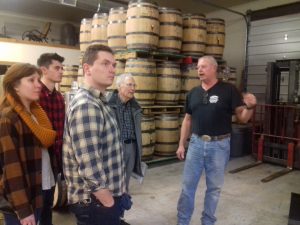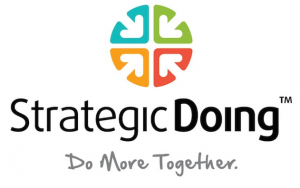By Aniko Drlik-Muehleck
In the lull before the finals week storm (or rather, in the midst of preparing for that storm), first year planning graduate students Aiden Forsi, Michael Graham, and Steph Nappa headed off on a whirlwind tour of Northeast Oregon. Their mission: to gain firsthand experience with the “New Natural Resource Economy.”
The new WHAT, you ask? Good question. PPPM Professor Emeritus Mike Hibbard and his research colleague Dr. Sue Lurie have been investigating what they call the new, or next, natural resource economy, aka NNRE, for many years. As part of a year-long project funded by Meyer Memorial Trust, the Ford Family Foundation, and the Oregon Community Foundation, Professor Hibbard and Dr. Lurie are partnering with the CSC to engage graduate students in an applied economic development project centered on the NNRE in Eastern Oregon.

But what is the new natural resource economy? For the long answer, we suggest you read Professor Hibbard’s and Dr. Lurie’s 2013 article in Society & Natural Resources. In brief, however, the NNRE is comprised of small businesses using natural resources in innovative ways that emphasize environmental stewardship. These businesses are contributing to new markets like sustainable farming, habitat restoration, and eco-tourism that complement –not necessarily replace –the traditional, extraction-based natural resource economy
It is perhaps easiest to illustrate with some examples from the students’ trip:
- Upper Dry Creek Ranch is a vertically integrated, 100% grassfed beef and lamb ranch. The Cosner family has worked for decades to create a system of ranching that centers on the health of their animals and their land.
- The Plantworks is a native plant nursery focused on habitat restoration. Sandy Roth and Dick Kenton collect seeds directly from habitat restoration sites, nurture these native plants through their initial stages of growth, then work to restore ecosystems using the plants.
- Stein Distillery is a micro-distillery sourcing local grain from the family farm. Owner Dan Stein transformed a hobby into an award-winning business when he opened to the public in 2009. Spent grains from the distilling process are returned to the farm as fertilizer for the crop that will feed the next batch of handcrafted whiskey, bourbon, vodka, rum, and cordials.
- Wilson Ranches Retreat is a bed and breakfast on a working, traditionally managed ranch. The Wilson family is committed to educating visitors about ranching practices that preserve and care for the delicate rangeland of North-central Oregon.
Natural resources and agriculture have always been the backbone of rural life, but the American economy is changing rapidly, shifting away from natural resources towards technology and services. This shift has left many rural communities behind. Professor Hibbard and Dr. Lurie believe that growth of the new natural resource economy may pave the way for rural revitalization in areas hard-hit by economic transition.
As the student team continues to investigate the NNRE in Eastern Oregon, stay tuned for ideas about how policymakers and economic developers can support this emerging sector.
